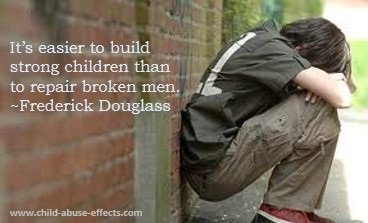Headline 2:
Government compensation for institutional child abuse

Headline 2: The Beattie Government in Australia has just announced a $100 million compensation fund for child abuse victims who suffered abuse in state-run institutions. Payments up to a maximum of $40,000 will be made to victims, but only if the person agrees not to sue the government.
Comments to Headline 2:
|
Should governments be able to shut down future lawsuits by settling with victims of child abuse today? This is a very complicated question, so let me play devil's advocate for a moment.
Government money is public money, tax money and money that has been collected from citizens who reside in that state or country. These governments are charged with the task of appropriately handling those monies received for the coffers. It is therefore in the best interest of the public for any potential lawsuits to be squelched. |
|
But is it in the best interest of the child abuse victim?
Victims of child abuse suffer from a multitude of emotional and physical problems. Many factors influence the severity of these problems:
- the type of abuse they suffered,
- the relationship the victim had with the abuser,
- the length of time the abuse took place, and
- the person's inborn ability to cope, to name a few
The offer of money for child abuse suffered to someone who is tormented by that abuse puts that person in an even more vulnerable position, particularly if that person has not received some form of support and assistance.
While the government offers support and assistance to victims in order to help with the long-term effects of child abuse, these compensation payments amount to little more than 'hush' money. And that hush money is woefully inadequate.
But no amount of money is adequate when it comes to compensation for years—decades, even—of suffering. Child abuse effects can be and are often life-long.
Many will take the compensation since it dispenses with the need of a trial, burden of proof and the expense of legal representation. Others will agree to the terms because they have little or no source of income, quite possibly due to the emotional disabilities associated with the abuse they endured. Still others will go with a take-the-money-and-run approach. With their plan, the Australian government is taking full advantage of the vulnerabilities of these abuse victims.
I have a few questions:
Did this compensation package come about because victims were suing the government over the abuse they suffered? Is this why the package was announced a full eight years after the state-run institutional abuse was exposed by the Forde Inquiry? If I was a betting woman, I'd lay odds that the government is attempting to minimize its accountability with this fund.
And speaking of the fund, who judges whether the individual suffered $40,000 worth of abuse or only say $5,000 worth of it? Is it based on one incident of abuse versus many incidents? Does physical abuse warrant less money than sexual abuse? Does emotional abuse or neglect even hit the radar screen? Who makes these determinations? Is there a checklist of questions asked? Are values attached to the answers?
Child abuse victims have lived a childhood of minimizing the abuse they suffered. Most didn't tell; and if they did tell, they were not believed or were told that it really wasn't all that bad. Any attempt to assess value to abuse suffered has the effect on the victim of minimizing what they endured.
One of my child abuse story submitters from the United Kingdom wrote me some time ago to tell me he had received a measly 8,000 pounds compensation for 7 years worth of physical and sexual child abuse he'd suffered at a state-run institution. The man lives every day wanting to die.
"I just want to feel clean for just a few seconds, just once feel normal and not a victim," he wrote.
A payment package, whether it's done through the courts or through a government trying to avoid the courts, isn't the answer for child abuse victims. I'm not saying victims aren't entitled to some sort of compensation. What I am saying is that compensation won't help them. Victims need validation, assistance and treatment to get on the road to healing and recovery.
Headline 2 originally posted June 3, 2007
References
NOTE: Information pages on this site were based on material from the
 Canadian Red Cross RespectED Training Program. Written permission was obtained to use their copyrighted material on this site.
Canadian Red Cross RespectED Training Program. Written permission was obtained to use their copyrighted material on this site.
From Victim to Victory
a memoir
How I got over the devastating effects of child abuse and moved on with my life
From Victim to Victory
a memoir
How I got over the devastating effects of child abuse and moved on with my life
Most Recent
-
Converging Stolen Lives
Jan 30, 18 01:13 PM
There was a time and space I didn’t think about you, or your abuse. Where when I looked back at my life, I only saw normal things, a normal childhood. -
A letter to one of the 13 Turpin children
Jan 29, 18 11:33 AM
A heartfelt letter by a former classmate that speaks to bullying and regrets. You'll find it on my Facebook group. I hope you'll join and get in on the discussion. -
Dissociated From Abuse
Jan 29, 18 11:00 AM
I was sexually abused by my father from age 6 to 13, which stopped when I started talking about it during the day. The teenage brother of my best friend


